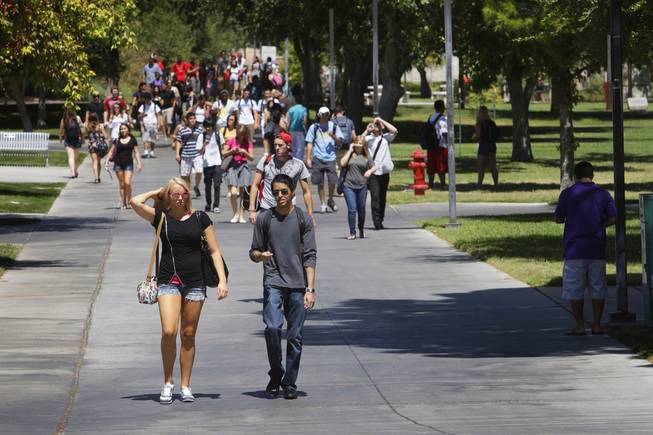
Students walk southbound in the quad area during the first day of the fall semester at UNLV Monday, August 23, 2010.
Thursday, May 1, 2014 | 5:05 p.m.
UNLV plans to survey its students about campus safety and provide additional staff training after the White House released recommendations this week to curb sexual assaults on college campuses.
After several high-profile cases of mishandled investigations at several colleges nationally, President Barack Obama convened a task force in January to come up with recommendations to strengthen policies and laws that are supposed to protect students from sexual assault. The task-force recommendations, included in a 20-page report and new website NotAlone.gov, were released this week.
“Colleges and universities need to face the facts about sexual assault. No more turning a blind eye or pretending it doesn’t exist,” Vice President Joe Biden said in a statement. “We need to give victims the support they need — like a confidential place to go — and we need to bring the perpetrators to justice.”
Federal laws, including Title IX and the Clery Act, prohibit sex-based discrimination on college campuses and mandate that universities report incidents of sexual harassment and violence. However, these laws haven’t always been clear on how colleges should prevent and respond effectively to sexual assault cases.
The new recommendations, which are only advisory, outline best practices for addressing sexual assault on campuses, including:
• Conducting annual surveys of “campus climate.” These polls will help determine public opinion of campus safety and the extent of under-reported sex assault cases on campus.
• Educating students and staffers about preventing and reporting sexual assault. The White House’s public service announcements, featuring celebrities such as David Beckham and Jeremy Lin, encourage students to stop sexual assaults before they happen. The administration also reinforced laws that mandate staff reporting of student sexual assaults.
• Improving reporting, investigative and disciplinary procedures. The White House recommends providing confidential counselors to help rape survivors connect with health resources and notify the proper authorities. The administration released protocols for sex assault reporting as well as a checklist for a model sexual misconduct policy.
At UNLV, many of these practices are already in place, officials said Wednesday.
“Our primary focus is student safety,” said Harriet Barlow, UNLV’s Title IX coordinator. “We want to do everything we can to keep everyone safe. Even one (sexual assault) is too many.”
Staffers are trained to encourage victims of sexual assault to seek medical attention, counseling and advice from a Women’s Center advocate. Students have a variety of options to file criminal and/or disciplinary charges to UNLV Police or the Office of Student Conduct.
Reports, and any information shared with the university, will be kept private, unless there are extenuating circumstances such as court subpoenas. Victims may also request a “no contact order,” which is like a restraining order.
The accused can face criminal charges through the judicial system and disciplinary sanctions from a campus process. Usually a panel of four campus members, including faculty and at least one student, will determine if the accused student is guilty. They could face sanctions depending on the severity of the crime, from mandatory counseling to suspension or expulsion.
UNLV has had relatively low numbers of sexual assault cases. In 2012, the most recent year for which data are available, there was one case of forcible sexual assault and one case of nonforcible sexual assault at UNLV.
This can be attributed to the low number of students living on campus. Most UNLV students live off-campus. The Clery Act requires only that colleges report crimes that occur on campus.
However, another reason why UNLV has a low number of sexual assault cases is perhaps because rape is one of the most underreported crimes. Nationally, 1 in 5 women is sexually assaulted in college, but few report the crime, officials say.
The new White House guidelines will help create a campus culture nationally where students are more emboldened to report sexual harassment and assault and be supported, said Phillip Burns, director of UNLV’s student conduct office.
“There’s a chilling effect,” he said. “I almost hope we get more (sexual assault) reports because that means more people are comfortable coming forward.”

Join the Discussion:
Check this out for a full explanation of our conversion to the LiveFyre commenting system and instructions on how to sign up for an account.
Full comments policy